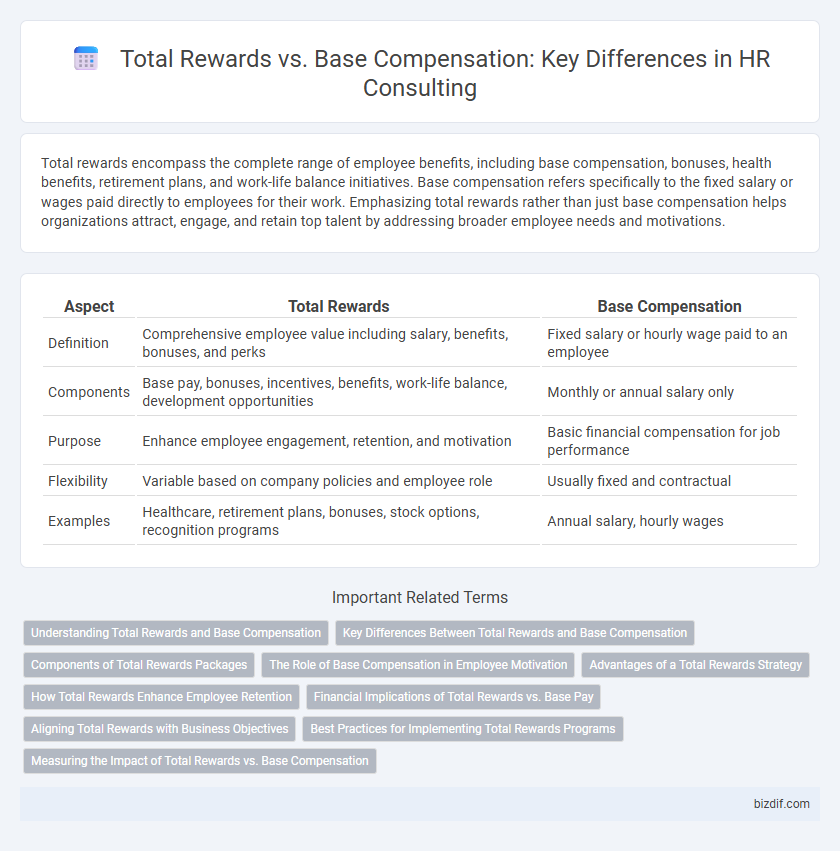Total rewards encompass the complete range of employee benefits, including base compensation, bonuses, health benefits, retirement plans, and work-life balance initiatives. Base compensation refers specifically to the fixed salary or wages paid directly to employees for their work. Emphasizing total rewards rather than just base compensation helps organizations attract, engage, and retain top talent by addressing broader employee needs and motivations.
Table of Comparison
| Aspect | Total Rewards | Base Compensation |
|---|---|---|
| Definition | Comprehensive employee value including salary, benefits, bonuses, and perks | Fixed salary or hourly wage paid to an employee |
| Components | Base pay, bonuses, incentives, benefits, work-life balance, development opportunities | Monthly or annual salary only |
| Purpose | Enhance employee engagement, retention, and motivation | Basic financial compensation for job performance |
| Flexibility | Variable based on company policies and employee role | Usually fixed and contractual |
| Examples | Healthcare, retirement plans, bonuses, stock options, recognition programs | Annual salary, hourly wages |
Understanding Total Rewards and Base Compensation
Total rewards encompass not only base compensation but also benefits, bonuses, incentives, and other non-monetary perks that collectively enhance employee satisfaction and retention. Base compensation refers strictly to the fixed salary or hourly wage paid to employees, forming the foundation of their financial remuneration. A comprehensive understanding of total rewards allows HR professionals to design competitive packages that align employee motivation with organizational goals.
Key Differences Between Total Rewards and Base Compensation
Total rewards encompass a comprehensive package including base compensation, bonuses, benefits, retirement plans, and non-monetary incentives, whereas base compensation refers solely to the fixed salary or hourly wage paid to an employee. Total rewards strategies aim to enhance employee motivation, engagement, and retention by combining financial and non-financial elements, while base compensation primarily addresses direct monetary payment for work performed. Understanding the distinction helps HR professionals design competitive and effective compensation structures aligned with organizational goals and employee needs.
Components of Total Rewards Packages
Total rewards packages encompass base compensation, variable pay, benefits, and non-monetary recognition, creating a comprehensive approach to employee motivation and retention. Base compensation represents the fixed salary or hourly wage, while variable pay includes bonuses, incentives, and commissions tied to performance. Benefits such as health insurance, retirement plans, and paid time off, combined with work-life balance initiatives and career development opportunities, complete the total rewards strategy to enhance employee satisfaction and engagement.
The Role of Base Compensation in Employee Motivation
Base compensation serves as the foundational element of total rewards, directly influencing employee motivation by providing financial security and recognition for job performance. Competitive base salaries align employee efforts with organizational goals, enhancing retention and productivity while minimizing turnover risks. Effective HR consulting emphasizes structuring base pay strategically to meet market benchmarks and support long-term motivation within total rewards programs.
Advantages of a Total Rewards Strategy
A total rewards strategy enhances employee engagement and retention by combining base compensation with benefits, bonuses, and non-monetary incentives tailored to diverse workforce needs. This holistic approach supports business objectives through flexible, customized rewards aligning with individual performance and organizational culture. Implementing comprehensive total rewards programs improves talent attraction and fosters long-term commitment by addressing financial and psychological motivators.
How Total Rewards Enhance Employee Retention
Total rewards, encompassing base compensation, bonuses, benefits, and recognition programs, significantly enhance employee retention by addressing both financial and non-financial motivators. Companies with comprehensive total rewards strategies experience lower turnover rates and higher employee engagement, as employees feel valued beyond just their paycheck. Integrating wellness benefits, career development opportunities, and flexible work arrangements within total rewards fosters loyalty and long-term commitment.
Financial Implications of Total Rewards vs. Base Pay
Total rewards encompass base compensation, bonuses, benefits, and non-monetary incentives, all of which influence employee retention and productivity while impacting organizational budgets. Base pay represents a fixed financial outlay, whereas total rewards require strategic allocation of funds across multiple components to optimize workforce motivation and cost-efficiency. Understanding the financial implications of total rewards versus base pay helps HR leaders design compensation structures that balance short-term cash flow with long-term talent investment.
Aligning Total Rewards with Business Objectives
Total rewards encompass base compensation, benefits, incentives, and recognition programs strategically aligned to drive organizational performance and employee engagement. Integrating these elements with business objectives ensures competitive positioning, talent attraction, and retention while optimizing cost-efficiency. Data-driven HR analytics play a critical role in continuously refining total rewards strategies to support evolving company goals and workforce needs.
Best Practices for Implementing Total Rewards Programs
Best practices for implementing total rewards programs include conducting comprehensive market benchmarking to ensure competitive base compensation and aligning variable pay with performance metrics. Integrating benefits such as health insurance, retirement plans, and wellness initiatives enhances employee value perception beyond base salary. Clear communication of total rewards components fosters transparency and supports talent retention by demonstrating the organization's commitment to holistic employee well-being.
Measuring the Impact of Total Rewards vs. Base Compensation
Measuring the impact of total rewards versus base compensation requires analyzing employee engagement, retention rates, and productivity metrics to understand the comprehensive value provided by benefits, incentives, and work-life balance initiatives. Total rewards, encompassing bonuses, health benefits, and professional development opportunities, often yield higher employee satisfaction and motivation compared to base salary alone. Data-driven HR analytics platforms enable organizations to quantify the correlation between total rewards programs and key performance indicators, driving strategic compensation decisions.
total rewards vs base compensation Infographic

 bizdif.com
bizdif.com